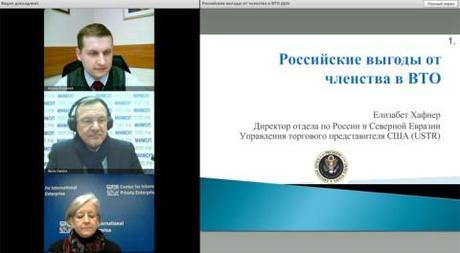
The World Trade Organization (WTO) welcomed Russia in August of last year as its 156th member — the last of the world’s large economies to join. The process, taking nearly two decades, had been steeped in anxiety and high expectations within Russia.
Now that Russian firms and their foreign counterparts can better grasp the practical consequences of WTO membership, corporate executives, entrepreneurs, and regional development officials are turning to the nuts and bolts of membership. Moscow-based CIPE partner the International Institute of Management for Business Associations (IIMBA) is at the forefront of these efforts, holding a raft of classes and webinars designed to help Russian businesses understand the promises and pitfalls of WTO membership. IIMBA is helping shape the discussion on the issue, taking a no-nonsense approach free of the sparring which grabs headlines having to do with U.S. agricultural imports and Russian rules benefitting the automobile industry.
On March 5, CIPE helped introduce a highly-informed U.S. point of view into IIMBA’s ongoing WTO series with a presentation by Elizabeth Hafner, Deputy Assistant U.S. Trade Representative for Russia and Eurasia at the Office of the U.S. Trade Representative. Hafner, based in Washington DC, first gave a presentation on the benefits of WTO membership for Russian businesses via webcast from CIPE’s Washington office. She then took live questions from some of the 182 participants connected to the webinar from Kazakhstan, Uzbekistan, and a host of Russian cities including St. Petersburg, Volgograd, Moscow, and Ufa. Watch a webcast of the presentation.
“What Russian goods have been imported into the United States recently?,” asked a participant from Vladivostok, located nine time zones east of Moscow. “Russia could not become a member of the WTO because of problems with intellectual property, and these rights are still violated in Russia. Will this be a problem for Russian companies?” queried someone from the chamber of commerce in St. Petersburg. A number of the questions focused on how Russian firms might interest U.S. consumers in their wares.
In her answers, Hafner emphasized that the WTO provides a strong framework for U.S.-Russian trade to develop but also that in order to take full advantage of the opportunities Russia must implement its obligations. It is a point echoed in a recent article on by Will Pomeranz, the acting director of the Kennan Institute at Washington’s Woodrow Wilson Center for Scholars. In the insightful piece, “Russia’s Global Trade Agenda,” Pomeranz argues that, despite positive changes in institutions and mindsets that give Russia significant potential, the country still suffers from a debilitating gap between laws as they are drafted and laws as they are applied.
“Russia has introduced an independent system of commercial courts over the past two decades that is reasonably well-regarded by disputants. Even the court’s own chairman, however, recently admitted that the enforcement of court decisions remains highly problematic. In light of such negative pronouncements and persistent legal uncertainty, both Russian and multinational companies are reluctant to invest in Russia without the option of litigating – and moving money – abroad.”
As Hafner, Pomeranz and a number of IIMBA presenters on WTO issues have noted, Russia is poised to play an increasingly influential role in global trade and, potentially, reap significant benefits. According to some estimates, membership will boost Russia’s GDP by 3.3 percentage points in the coming years. With Russia’s current presidency of the G-20 and, in 2014, of the G-8, the Russian government will doubtless seek to become a leading voice in defining global trade issues. As that happens, CIPE and the IIMBA will continue to provide a context rooted in the concerns of Russia’s entrepreneurs.
“WTO membership means that Russia is no longer on the outside looking in when it comes to international trade,” Pomeranz writes. “Yet despite being the newest member of the club, Russia brings an established trade agenda and firm grasp of its national interests to the table.”

